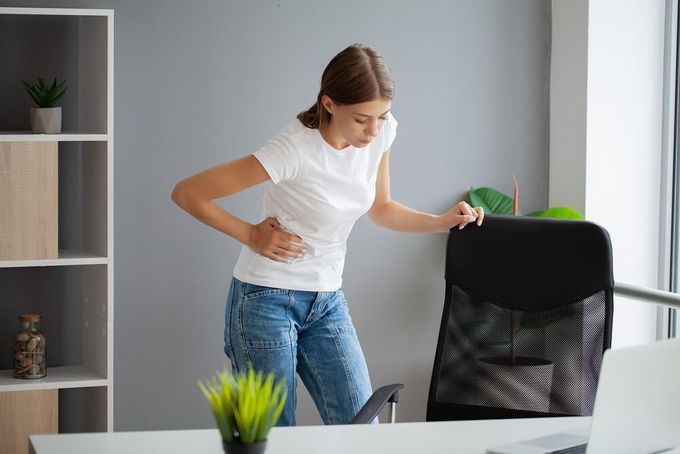7 Ways to Deal with Period Cramps & Heavy Bleeding at Work (Expert Advice)
Learn how to manage period cramps and heavy bleeding while working
Updated November 3, 2023.

According to a cross-sectional survey, severe menstrual cycle symptoms—such as painful or heavy periods—can impact workplace productivity. Employees report they have no means to address the critical issue adequately.
I want to talk about my advice on managing period-related discomfort and heavy flow in a professional setting and how you can address these issues with your employer.
The initiative includes steps such as:
1. Preparation
2. Mastering pain management
3. Open communication
4. Utilizing breaks wisely
5. Managing PMS symptoms
6. Addressing heavy flow
7. Seeking professional help
1. Preparation is Key
You need to prepare when dealing with period cramps or heavy flow at work. Excessively tight-fitting clothing or open air around the stomach can worsen cramping and discomfort, so I recommend loose-fitting outfits that cover your midriff and keep it warm.
For menstrual products, use organic, unscented, and non-toxic brands—free from endocrine disruptors like phthalates.
Make sure to keep spare menstrual products and pain relief readily available. Many non-toxic period products come in discrete bags, so you can discretely carry them to the bathroom or slip them in your pocket on the way.
2. Mastering Pain Management
Dysmenorrhea—or painful period—is the most common gynecological condition in the US, affecting between 50-90% of women.
The standard approach to addressing period pain is hormonal birth control, and NSAIDs such as Advil and Aleve. Although these medications help with pain, they can negatively affect your gut health. Plus, they don't address the root cause of your pain.
I recommend a more holistic approach that includes vitamins, herbs, acupuncture, and lifestyle changes.
Some of the natural ingredients that you can use to deal with PMS and cramps are:
- Cramp bark and black haw: They're plant-based liquids you can find at local herbal or reputable online stores. You can use them up to four times a day for acute pain.
- Ginger: You can drink it in a tincture or a tea with chamomile to calm your cramps.
- Magnesium and Fish oil: As a supplement, these can both have a positive impact over a period of time.
Tools like heating pads, hot water bottles, and aromatherapy allow more downtime and rest during bleeds. Moderate exercise and adequate sleep in the days leading up to your period can also help decrease pain.
3. Open Communication
Though uncomfortable, I encourage you to talk openly about your period with your boss and co-workers. Be professional and frame your requests so it's clear they help with your productivity.
Raise awareness about period pain at work
Share research articles or pamphlets about period pain and how it affects the workplace to educate your co-workers.
If your boss isn't supportive, consider involving your HR department to ensure you receive the necessary accommodations. Also, keep a record of how your menstrual symptoms affect your work, including days off or adjustments to work demands.
» Read more about why period leave matters and how to talk about it with your male boss
4. Utilize Breaks Wisely
Muscle tension can worsen cramps, so take short breaks to walk and relax. You can also use the downtime to stretch at your desk or in the restroom to release tension and improve blood flow.
5. Managing PMS Symptoms
PMS symptoms appear before the period. You can use a journal to track them, identify triggers, and monitor changes over time. Some controlled trials even suggest mindfulness to manage the stress associated with PMS.
Women who experience PMS often have nutrient deficiencies, so prioritize meals rich in vegetables, healthy fats, and adequate fiber. Also, remove caffeine and artificial sweeteners to stabilize cramps, and drink more water to reduce bloating.
6. Addressing Heavy Flow
So, how do you deal with heavy periods at work?
Keep a spare change of clothes and extra menstrual products in your car or at work in case of emergencies. Also, wear layers or dark-colored clothing to minimize the visibility of leaks.
Menstrual cups often last longer for heavy flow days and combining them with period underwear can aid as a backup leak protection.
7. Seek Professional Help
There are many myths that painful menstruation is a sign of fertility, but the truth is that your period shouldn't significantly affect your quality of life. If you have notable period pain, stabbing pain or other concerns, consult a healthcare professional.
Share your complete medical history with your healthcare provider, including any genetic or gynecological conditions.
Advocate for yourself during the visit. Ask questions so you can understand your diagnosis, treatment options, potential side effects, and the treatment risks to make an informed decision.
Taking Charge of Period Discomfort and Heavy Flow
To ensure you remain productive during your menstrual cycle, you must clearly communicate your needs to your boss. You can better prepare yourself for the pain by working with a holistic provider or acupuncturist. Also, prioritize your mental health and seek medical attention for severe or concerning symptoms.
To track your cycles and symptoms, you can use Tempdrop. It's also an effective tool that uses temperature readings to help you more accurately identify your fertility window if you want to conceive.






